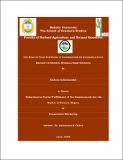| dc.description.abstract | The research was conducted in Enderta Woreda, in southern zone of Tigray National
Regional State, to assess the beneficiaries’ perception on the role of food for work and to
review and assess the discouragement effect. During the study, primary data were collected
from 120 members of a multi purpose cooperative and 30 non members. In addition
secondary data were collected from the relevant institutions.
For the data analysis, descriptive statistics such as frequency distribution and percentages
were used to describe institutional and socio-economic characteristics of the respondents. In
addition, the t and Chi-square tests were employed to test the relationship of dependent
variables with respect to some explanatory variables. A Multiple regression model was used
to analyze factors influencing average annual income of respondents.
The study revealed that the FFW beneficiaries have better access to food and their
availability to food was also improved. The nutritional status has improved due to their
participation in the project. FFW projects have also protected from migration for the 98.6%
of the respondents. Moreover, it helped 88.4% of the respondents to enroll more children in
schools. Besides, the study findings indicate that the only source of income for the majority
of the respondents was farming. Even though, there are some problems in targeting in food
aid, the study revealed that targeting in food for work was fairly done. This was confirmed by
94.3% of the respondents. Respondents in the survey area conformed that (51.4%) the
payment was not enough and (48.6%) said it was enough. It was found from the study, the
the average year of participation on food for work projects was 6 – 9 years. According to the estimates of the regression model the variables which greatly affect the income of
respondents include age of beneficiaries and number of oxen owned. | en_GB |


